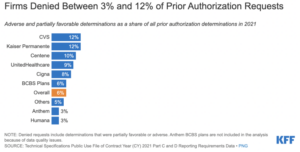Medicare Advantage Plans Denied Two Million Prior Authorization Requests in 2021

February 8, 2023
by Diane Archer
Imagine that you were given a wad of cash to deliver a service when necessary. And, it was in your discretion to determine when the service was necessary. That’s effectively the way Medicare Advantage works, with the federal government giving Medicare Advantage plans, health plans offering Medicare benefits, an upfront monthly payment and the discretion to decide when care is medically necessary. Not surprisingly, the Kaiser Family Foundation has just determined that, overall, health plans offering Medicare Advantage denied two million of 35 million prior authorization requests in 2021, for services treating physicians determined were needed.
Put differently, across the spectrum of nearly 4,000 Medicare Advantage plans, six percent of requests for authorization of services were denied. The Medicare Advantage plans hire physicians to assist them in withholding or delaying care. They often are not specialists in the area of care they are reviewing. On appeal, the vast majority of denials were fully or partially overturned. But, only a tiny fraction of denials were appealed.
Anthem, Humana and Centene had the highest percentage of prior authorization requests. But, CVS, Kaiser and Centene denied the highest percentage of requests, 12 percent, 12 percent and 10 percent respectively. What we don’t know is which types of services were most frequently denied. Kaiser explains that it could not answer these questions because CMS does not make this information available. It might not even collect it.
Anthem Medicare Advantage plans received the most requests for prior authorization, nearly three for each of its enrollees. Kaiser Permanente received 0.3 requests for each of its enrollees. Centene and CVS overturned the overwhelming majority of denials that were appealed.
The data does not reveal the reasons that Medicare Advantage plans most frequently deny prior authorization requests. A recent Pro Publica report on United Healthcare’s practices suggest that, if a service is particularly expensive, some Medicare Advantage plans are probably more likely to find a doctor to deny the service regardless of how critical it might be to a patient’s health and well-being. A recent report from the Office of the Inspector General at the Department of Health and Human Services found that costlier services, such as nursing and rehab, are more likely to be denied.
READ FULL ARTICLE HERE
